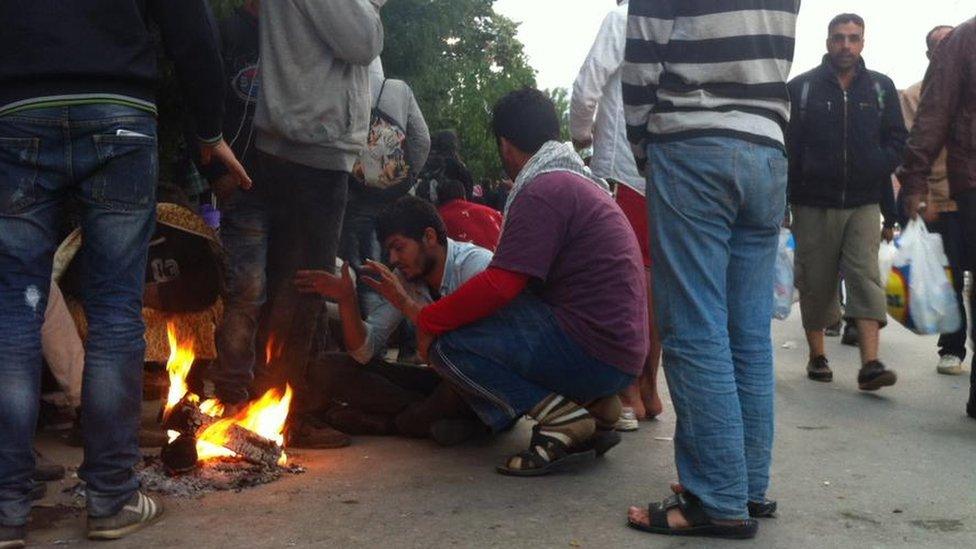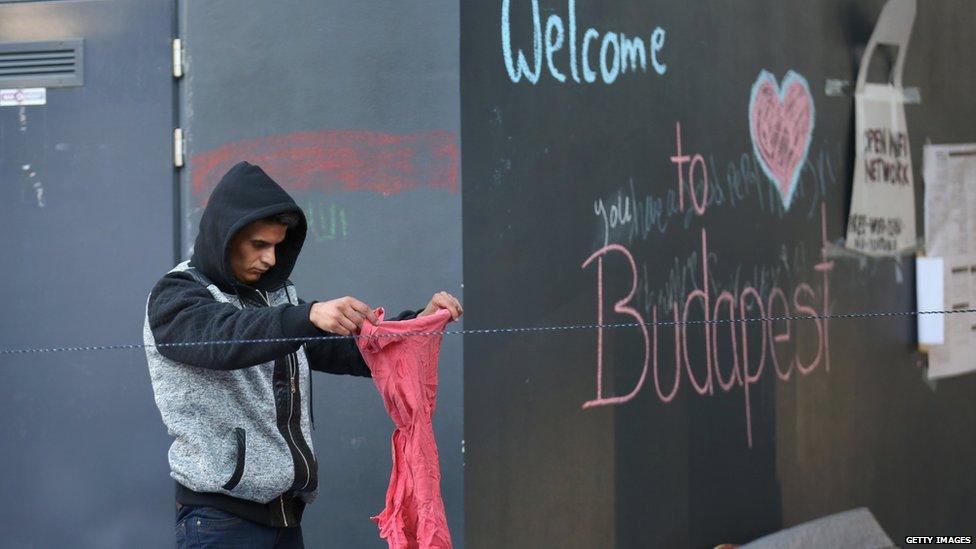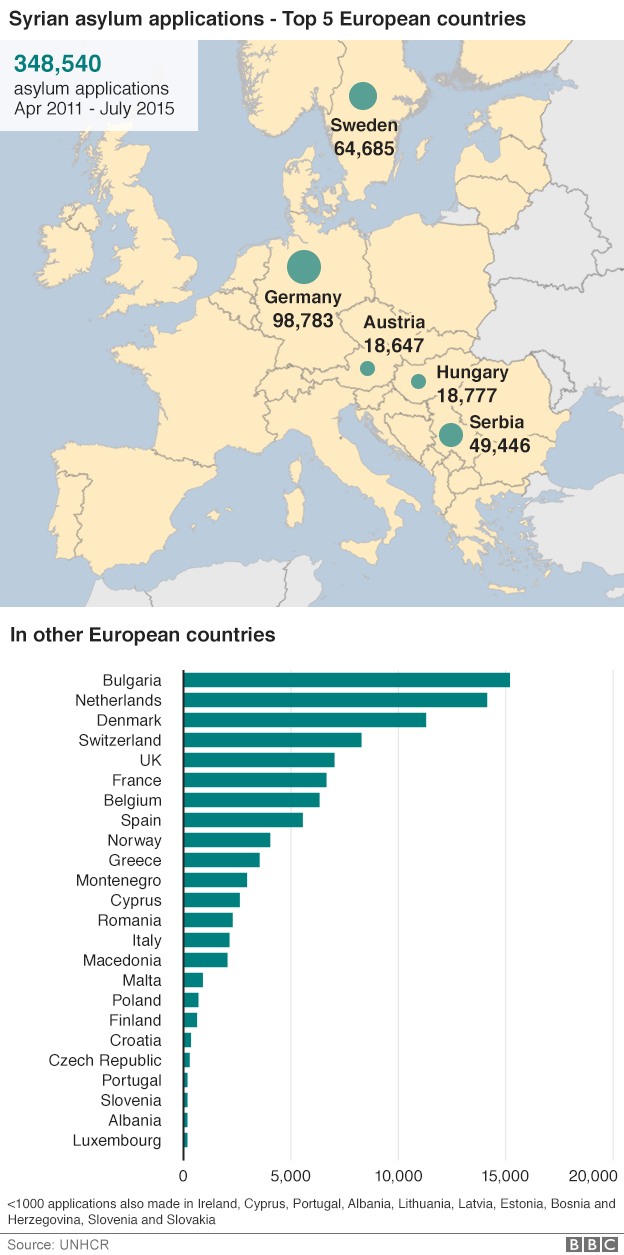Migrant crisis: Greece acts over Lesbos 'explosion' fears
- Published
The BBC's Jonny Dymond says there is desperation among the migrants on Lesbos
The Greek government and the UN refugee agency have brought in extra staff and ships to deal with some 25,000 stranded migrants on the island of Lesbos.
A processing centre has been also set up on an abandoned football ground to help the migrants to get to Athens.
A Greek minister said on Monday Lesbos was "on the verge of an explosion".
Meanwhile, hundreds of migrants broke through police lines on Hungary's border with Serbia and started walking towards the capital, Budapest.
The migrants faced down pepper spray used by police as they broke out of a holding centre in a cornfield and marched down a motorway towards Budapest. They later agreed to be taken by bus to another reception centre.
Further south, the BBC's James Reynolds reports long queues of migrants waiting to pass from Macedonia into Serbia on the border town of Presevo.
The issue has unsettled European governments and prompted diverse responses - Hungary's conservative leadership is building a border fence to try to keep the migrants out while the German leadership expresses pride in crowds who turned out to welcome them in.

Local people are making money helping migrants in the Serbian border town of Presevo

Many migrants then make their way to Budapest in Hungary, where the government has ditched attempts to stop them moving further north
Hungary became a crunch point as thousands of migrants and refugees from the Middle East and Africa moved north to claim asylum in Germany and other countries.
Attempts to block the passage of migrants in Budapest failed on Friday, and some 20,000 migrants made their way from Hungary into Austria and Germany over the weekend.
Then on Monday Hungarian Defence Minister Csaba Hende surprised even his own colleagues when he resigned, in a move correspondents say was clearly related to problems with the construction of a border fence meant to keep migrants out but which has so far proved ineffective.

German Chancellor Angela Merkel has warned that the "breathtaking" flow of migrants into Germany will change the country in the coming years.
In other developments:
The UK will accept up to 20,000 refugees from war-torn Syria over the next five years, David Cameron told MPs
At least 150 migrants in southern Denmark have tried to march towards the border with Sweden, forcing police to close a motorway
The US administration "is actively considering a range of approaches to be more responsive to the global refugee crisis, including with regard to refugee resettlement", a White House spokesman has said.
What next for Germany's asylum seekers?
Peston: Why Germany needs migrants more than UK
What can the EU do to solve the crisis?
The other exodus to Germany - people from the Balkans
On Monday, officials said that the processing centre on Lesbos would operate around the clock for five days.
But on Monday night, about a dozen coastguards and riot police armed with batons struggled to control some 2,500 migrants surging towards one such ship, reported AFP news agency.
Local authorities have been overwhelmed by the migrants - mainly from Syria, say officials - who have been forced to live in squalid conditions, our correspondent adds.
Lesbos is attractive to migrants as it is part of the EU nation of Greece which sits just off non-EU Turkey - the two are divided by just 5.5km (3.4 miles) of water.
Greek Migration Minister Yiannis Mouzalas warned that the island was "on the verge of explosion".
German, French and British leaders have promised to take in migrants
An estimated 340,000 asylum seekers have arrived in Europe so far this year, most braving dangerous sea journeys from North Africa and Turkey.
Germany, where most migrants are headed and which expects 800,000 asylum requests this year, has urged other EU states to help shoulder the burden amid opposition criticism of its open-border policy.
European Commission chief Jean-Claude Juncker is expected on Wednesday to unveil proposals to distribute 160,000 refugees among member states on a mandatory basis.
But the crisis has divided the 28-nation bloc.
Hungary, along with the Czech Republic, Slovakia and Romania, has rejected the idea of quotas - saying they would be futile if the EU's outer borders cannot be defended.


A note on terminology: The BBC uses the term migrant to refer to all people on the move who have yet to complete the legal process of claiming asylum. This group includes people fleeing war-torn countries such as Syria, who are likely to be granted refugee status, as well as people who are seeking jobs and better lives, who governments are likely to rule are economic migrants.

Are you in Lesbos? Are you affected by the issues raised in this story? Please email haveyoursay@bbc.co.uk, external with your experiences.
Please include a contact number if you are willing to speak to a BBC journalist. You can also contact us in the following ways:
WhatsApp: +44 7525 900971
Send pictures/video to yourpics@bbc.co.uk, external
Tweet: @BBC_HaveYourSay, external
Send an SMS or MMS to 61124 or +44 7624 800 100